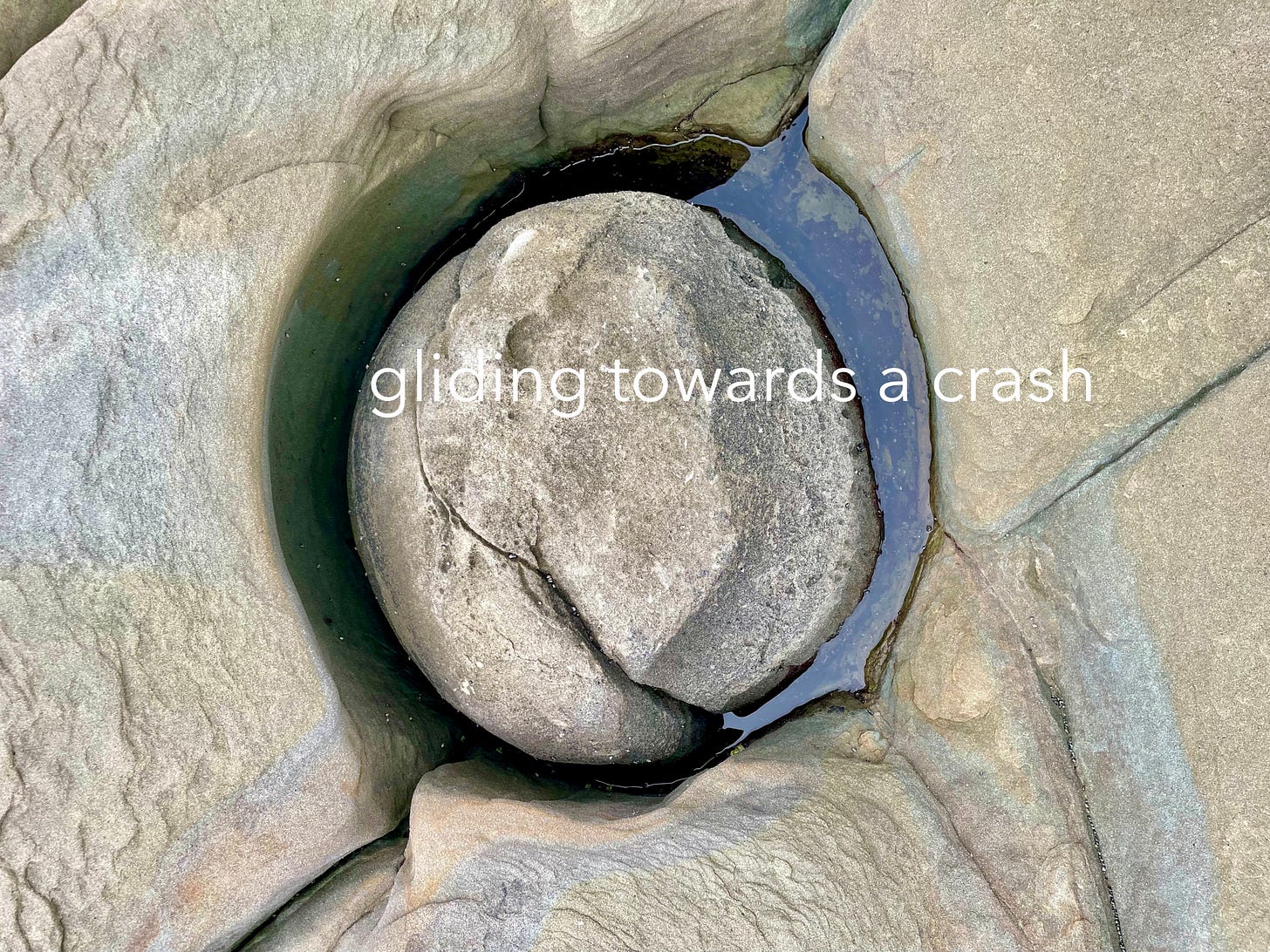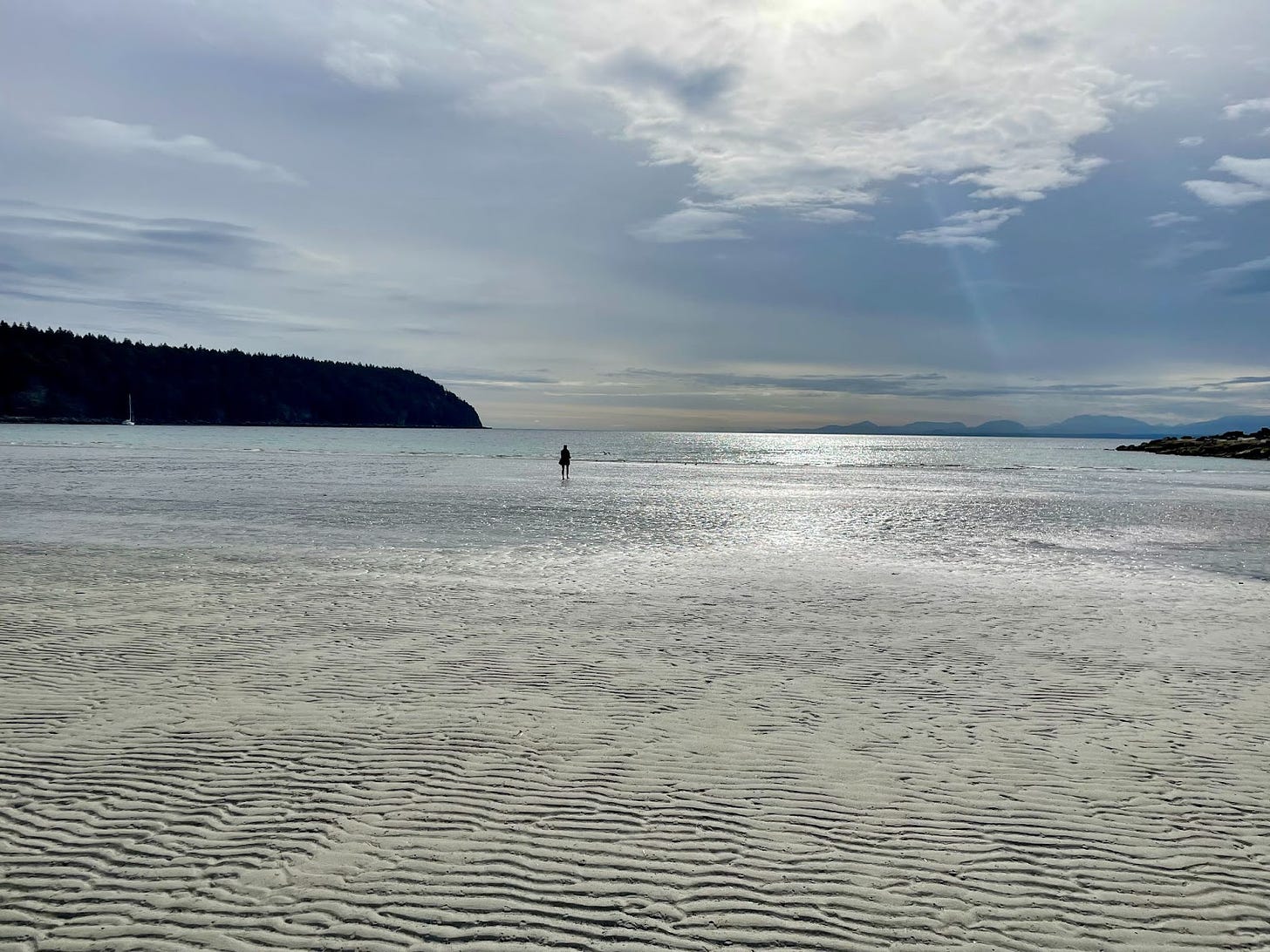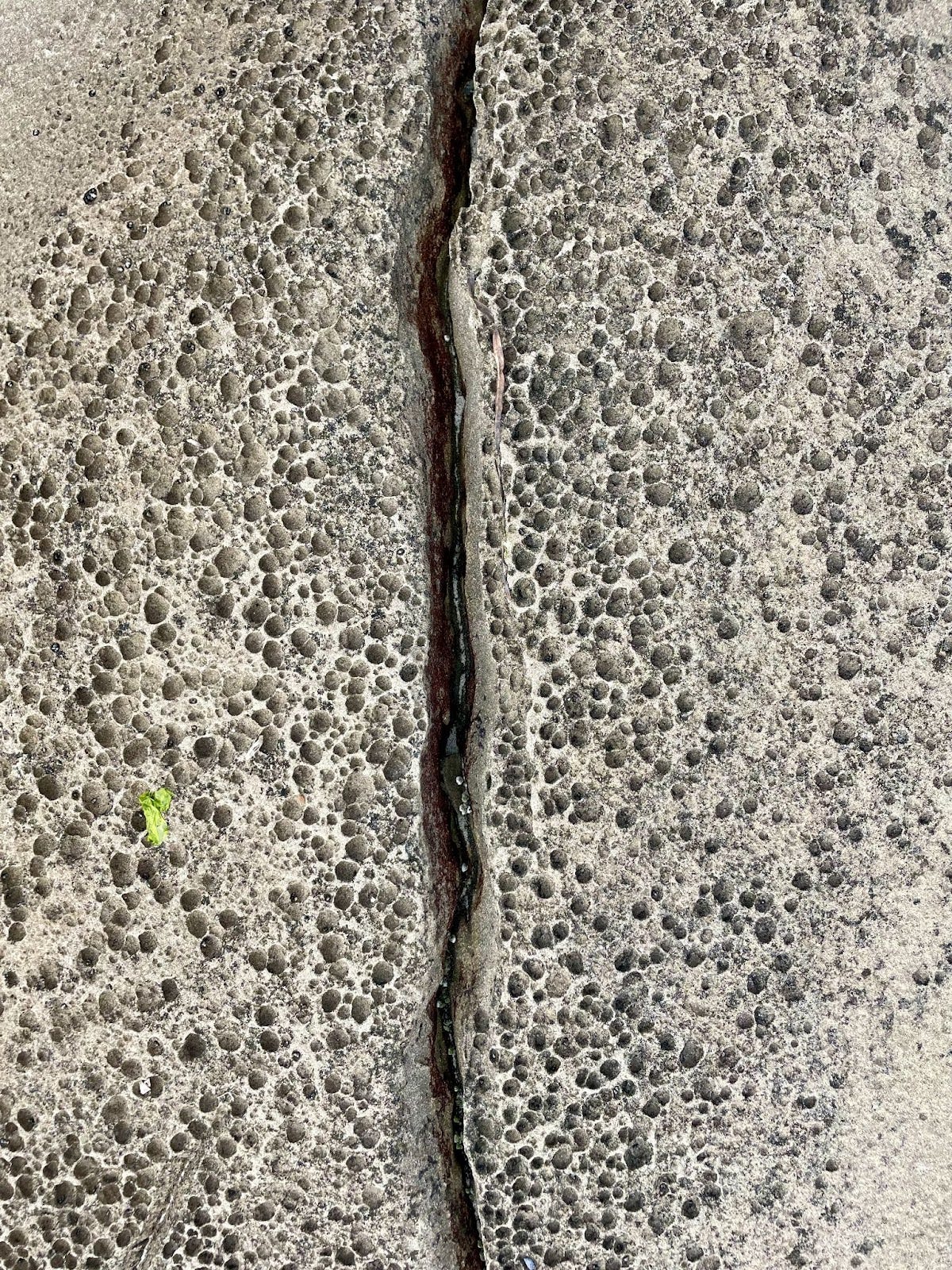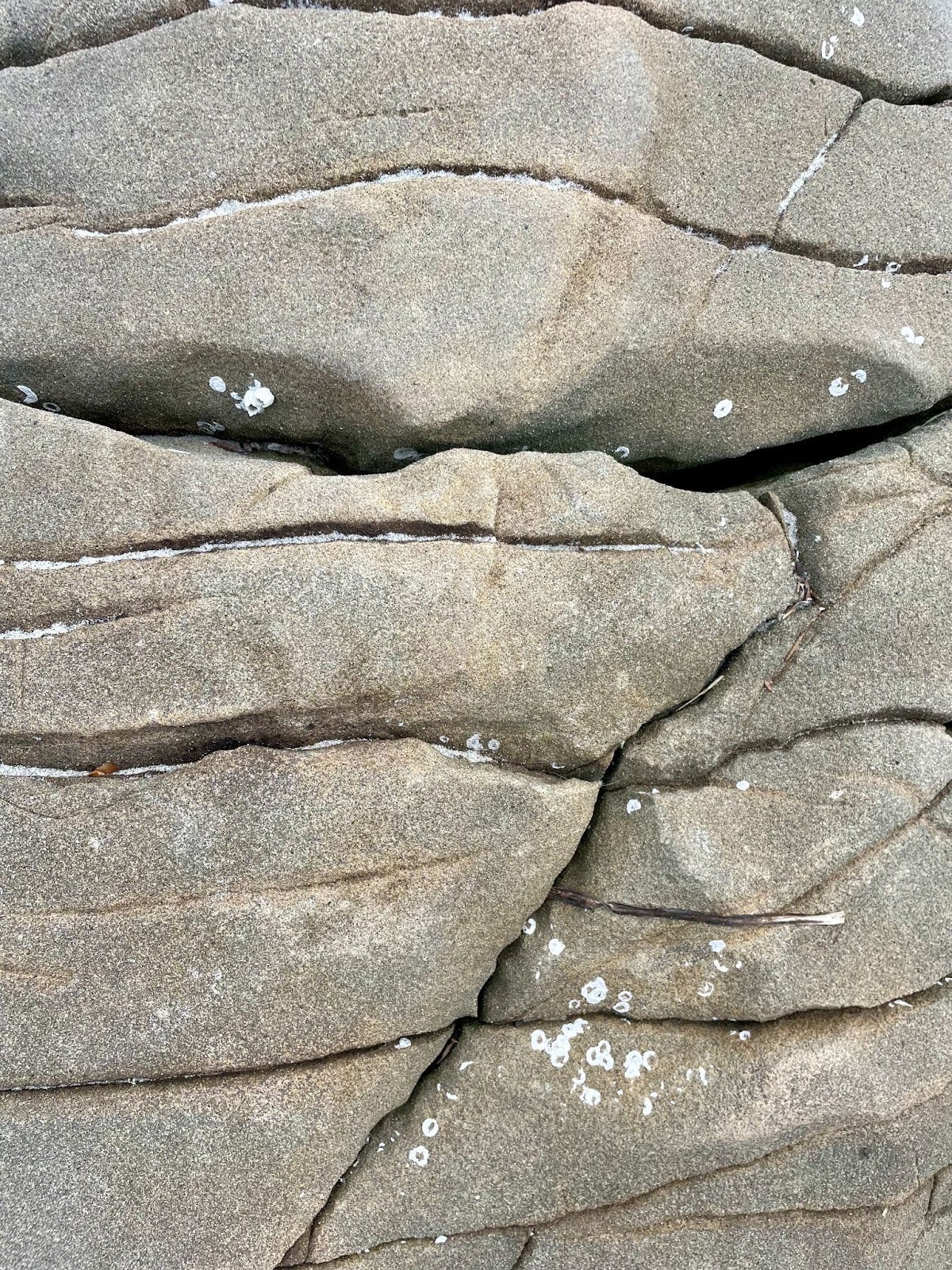Note: The narrated version of this posting (including soundscape compositions) is available here. All photos we taken by myself at Tribune Bay, Hornsby Island, BC on September 17, 2024.
Friends and colleagues often ask me why I focus my energies on ‘anticipating, observing, and experiencing societal disruption and collapse’ (deep adaptation forum).
A good question.
Instead of societal collapse, Arno Kopecky (author of The Environmentalist’s Dilemma: Promise and Peril in an Age of Climate Crisis and an upcoming guest on conscient e206), suggested to me in a September 14, 2024 email that I consider focusing on :
a thriving society lens so that we’re running toward something beautiful, rather than fleeing something terrible.
A good point.
Arno also mentions that ‘ultimately it's the same thing’, e.g., that societal collapse and societal revitalisation follow essentially the same path but I would agree that running towards something positive is more interesting (and useful than the negative.
Duly noted (as they say on the Canadaland podcast).
However, I have to admit that I quite often fall into collapse rabbit holes and sometimes can’t see the light so I call upon guests from previous episodes, such as e165 bill crandall - art can change us
Being an artist, or making art, in the context of climate is more about being a kind of light in the darkness, making us believe in ourselves and believe in the future so that we want to endeavor to save the thing that we have, our habitat. Some people like to say art can't change the world, but art can change us. Then we can change the world more effectively.
So here’s my answer to the ‘focus’ question.
It’s a story about a story that I recorded in e202 coman poon - what are you doing with your life ? :
When I first met Vanessa (Andreotti) in 2019, I think she shared this story with me about, you know, the metaphor of the plane crashed as a way of talking about the time of the great turning, so to speak, for lack of a better term. And this idea is that there is no. There is no prevention of the crime, right? If you and I, and, you know, every living thing that is on, so called, the plane is on Pachamama, Mother Earth with us, we're going through a crash. We're going through, you know, six, extinction, we're going through climate collapse, geopolitical collapse, economic collapse, all types of overlapping, interlaced cycles of destruction. And like on planes, what you can do, at best, is to get ready for a glide as opposed to a hard landing, because that means some will survive, and those that survive aren't necessarily the lucky ones. So while we're on the plane, you know, instead of putting on our noise canceling earphones, pretending that we're not in a sardine can, we could try turning to each other, saying hello. So many things can happen between the moment when we know the plane is going to crash, that there's no getting away from that and the crash itself. So my invitation is to the listeners, what are you doing? What are you doing before the crash, in this time? What are you doing with your life? How are you going to actually weave connection? Because it's still possible to operate without hope. It's absolutely imperative.
‘Saying hello’ is what I try to do with every a calm presence posting and also the conscient podcast - balado conscient.
Saying hello in Coman’s way.
I don’t feel doomist, defeatist or nihilistic in saying that. I don't feel like I’m being overly negative, proselytizing, virtue signalling or being self-righteous, though I have certainly done that in the past, and probably will again.
I did an episode about this: e111 traps - what are the traps in your life?:
Observer: I see a trap called proselytizing which happens when people try to teach and convince others that a particular issue of interest should be the most important thing for everyone.
Me: Wait a second, I do that all the time as a climate activist and with my art and ecology podcast and…
Observer :(interrupting) of course you do and well you should - no worries - but, the danger is that your work could be perceived as an effort to assert ‘moral high ground’ and while this trap may be driven by a genuine passion for an issue, and you certainly are passionate about your work, it has the potential to impose onto others in a way that does not respect their own un/learning journey, and often actually has the opposite effect, pushing people away rather than inviting them in.
Me: Ya, Ya, I see. Let me think about that.
Observer: Sure and when this trap occurs, it can be useful to ask, for example, why do I need to teach or convince or inspire others about my learning experience? Where is this perceived need stemming from? And if you really feel you need to bring something to the attention of others, maybe you can ask yourself: What is the most pedagogically responsible and effective thing to do so that your message can land?
But this is different.
It feels good to accept reality.
Not good, good because it’s actually awful and very painful, as we feel the disappearance of life unfold around us but for it’s better to accept reality than to live in denial.
It’s better to undergo a lens shift (my previous posting) and therefore see and feel things as they really are.
It’s better to be ready to die at any moment knowing that the truth of that moment was our final breath.
Now none of this is new. Buddhism and similar spiritual practices have been teaching us this forever.
So what’s next?
I try keep this excerpt from Robert Janes’ Museums and Societal Collapse : The Museum as Lifeboat in mind:
Hopeless need not mean helpless. On the contrary, hopelessness is the springboard to helpfulness – supportive, effective, and useful.’
In other words, how to be supportive, effective and useful while living on a plane that is gliding towards an inevitable crash.
My energy is not focused on fixing that gliding plane in mid-flight - tempting as that might be - but rather to focus on those who survive the crash so that they might have a fresh start.
And for those who follow the conscient podcast season 6 will beginning sometime in 2025 on ‘art and culture in times of crisis and collapse’ (excerpt from the first episode wiht Dr. Robert Janes) :
Claude: Welcome to conscient podcast, Bob.
Bob: Well, thank you very much. It's a pleasure to be here.
Claude: Now this is the beginning of season six, so I'm quite excited. And it's also early days. Today is Monday, September 16th, 2024, and we're at your farm (on Denman Island) and we've just been walking around with your son. It’s actually not your farm, but your son's farm or both of you.
Bob: It's a partnership.
Claude: So I'm not absolutely clear what season six is going to be in the end - it's early days - but I do know that I want to talk about art and culture in times of crisis and collapse and I see your book in front of me here called Museums and Societal Collapse : The Museum as Lifeboat…
I’m also working on an Artist Survival Kit.
I sometimes think it should be called ‘Artist Thriving Kit’ but I’m not there yet.
Thanks for listening.








I appreciate the depth of your reflections and care. Thank you for sharing!